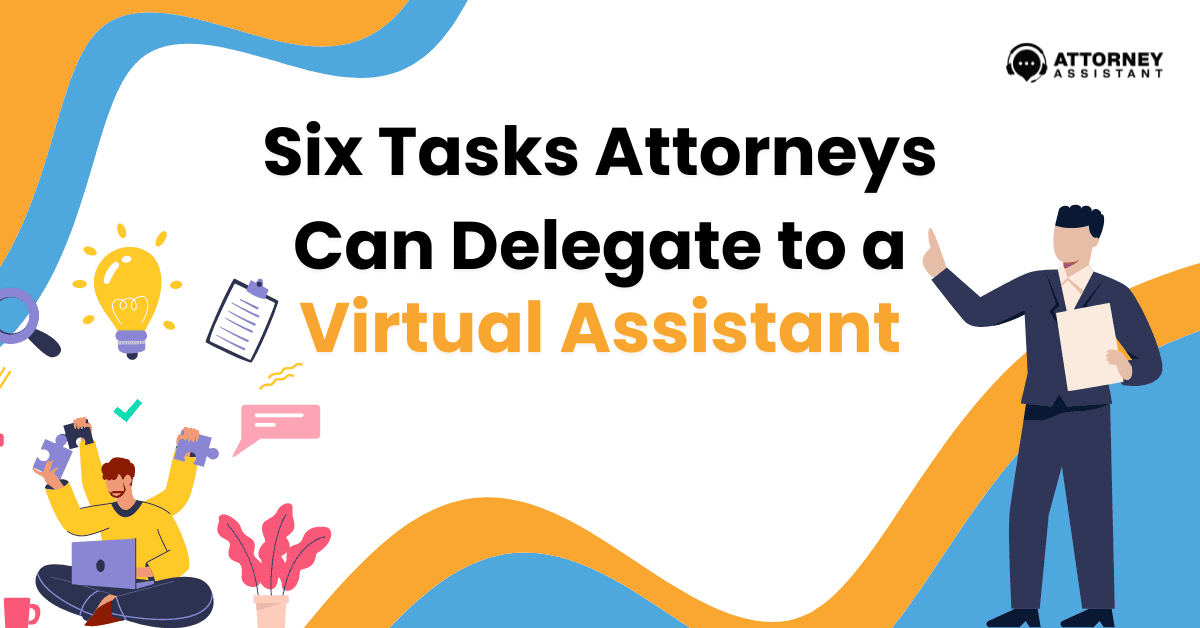Balancing client demands, court proceedings, and administrative tasks is everyday routine in legal practice. So, attorneys continually seek to simplify their work, optimize resources, and deliver better service to clients. This might mean using new software to automate routine tasks, adopting efficient case management systems, or improving how they communicate with clients. Now, imagine having a virtual legal assistant—a personal support partner. They handle both administrative tasks and legal details, giving you more time to focus on what really matters in your practice. Here are six key tasks a virtual legal assistant can take off your plate, and how this move can boost your law firm’s success.
Virtual Assistant: Your Remote Support
So, what exactly is a virtual assistant? They’re like your off-site allies, offering expert support from wherever they are. Whether they’re in busy cities or peaceful countryside retreats, they bring their best work to the table through an internet connection. Virtual assistants embody flexibility and efficiency, providing a modern alternative to traditional full-time employees. By tapping into this diverse talent pool, business owners and executives, like you, open doors to endless opportunities, all while managing costs effectively.
Who Benefits from Virtual Assistants?
Curious about who can tap into the advantages of virtual assistants? It’s practically everyone! Let’s delve into how various individuals and sectors can harness the power of virtual assistants. Here’s a closer look at these key groups poised to thrive with their support:
- Construction: Virtual assistants offer remote support in tasks like inventory management and administrative tasks.
- Education: Virtual assistants support online schooling systems and assist in research and recruitment, benefiting educational institutions.
- Farming and agriculture: Virtual assistants provide administrative and research support, bridging the gap between farmers and technology.
- Finance and accounting: Virtual assistants handle financial tasks like data management and invoicing, benefiting both businesses and individuals.
- Government and non-profits: Virtual assistants provide cost-effective support with tasks like managing social media and assisting customers.
- Healthcare: Virtual assistants manage records and appointments, supporting physicians and patients.
- Insurance: Virtual assistants efficiently manage inquiries and streamline claims processing, ensuring timely assistance to customers.
- Information and technology: Virtual assistants provide support in IT and web development, valuable for tech companies.
- Marketing and advertising: Virtual assistants manage social media, create campaigns, and optimize online presence, transforming the game for firms.
- Professional services and consulting: Virtual assistants handle tasks like report creation and customer service, freeing decision-makers to focus on important activities.
- Real estate: Virtual assistants provide support in marketing and transaction coordination, enabling agents to focus on deals.
- Small business owners and startups: Virtual assistants assist in various tasks, allowing entrepreneurs to focus on growing your business.
Virtual Legal Assistants Lighten Legal Work Demands
Legal work can be pretty hectic, with lawyers and support staff juggling tons of tasks daily. From writing legal papers to dealing with court matters, it can get overwhelming, leaving little time for strategic thinking.
Imagine the daily grind of a lawyer: buried in paperwork, racing to meet deadlines, and trying to keep a balance in all the chaos. This fast pace affects the body and mental health. According to a 2023 study by ALM and Law.com Compass, 71% of lawyers reported feeling anxious, 38% experienced depression, and about 31% faced other mental health issues.
Amid all this, important things like billing, payroll, and dealing with clients also need attention. That’s where virtual legal assistants come in, offering crucial support to busy legal professionals.
A legal virtual assistant acts like a reliable partner, specializing in handling administrative tasks for law firms and attorneys. Working remotely as independent contractors, they ease the load by taking care of essential yet repetitive tasks. While they may not give legal advice, their support allows legal professionals to focus on what really matters in their practice.
Taking Advantage of Virtual Legal Assistants' Potential
Success in legal practice isn’t just about legal skills. It’s also about managing administrative tasks efficiently. Virtual legal assistants are reshaping how legal firms operate, becoming essential partners along the way. They offer a host of benefits, transforming business operations all while saving costs. Here’s why they’re an indispensable asset:
- Access to talent: Virtual assistants bring a world of skills to the table, tapping into a global talent pool. Attorneys can scale up or down as needed.
- Better customer service: Virtual assistants keep customer service running smoothly. They ensure prompt responses and maintain a positive brand image, which are crucial in today’s digital world.
- Boosted efficiency: Virtual assistants handle routine tasks. Business owners and staff can focus on more strategic work. This efficiency boost means better productivity and a healthier work-life balance.
- Cost savings: Hiring a virtual assistant slashes operating costs, ditching the need for large offices and big teams. This lets businesses invest in smarter ways to organize teams and manage projects.
- Flexibility: Virtual assistants can work from anywhere. This set-up offers a lifeline for employees balancing work with other responsibilities like family or health.
- Improved well-being: Virtual assistants reduce stress and boost emotional well-being of business owners and staff by tackling routine tasks.
- Increased productivity: They increase productivity by freeing up time handling routine tasks.
- Scalability: Virtual assistants can grow or shrink with business needs. They’re ideal for startups and small businesses aiming to expand efficiently.
- Specialized skills: Virtual assistants bring specialized expertise. They give businesses access to skills they might not have in-house like bookkeeping and social media management.
- Streamlined processes: Virtual assistants handle tasks like data entry and research, smoothing out workflows and making business operations more efficient.
Six Tasks to Delegate to a Virtual Assistant
Administrative support: Virtual legal assistants excel at keeping your law firm running smoothly, handling essential tasks so you can focus on your practice.
- Client communication: Keeping clients informed is crucial. Your virtual assistant can handle client inquiries and communications, ensuring everyone stays updated and satisfied.
- Document preparation and management: From drafting letters to organizing court documents, your virtual legal assistant takes care of all your paperwork with precision and efficiency.
- Email management: Say goodbye to inbox overflow. Your virtual legal assistant filters through emails, prioritizing what’s important and drafting responses for you.
- Research: Your law firm virtual assistant is your go-to for information. They gather and organize materials, saving you valuable time and effort.
- Scheduling and calendar management: Virtual assistant for law firms keeps your calendar organized, ensuring you never miss anything.
Client communication and intake: Effective communication is vital for any law firms. A legal virtual assistant focusing on client communication can improve client relations. Here’s what they excel at:
- Client inquiries: First impressions count, especially when potential clients contact your firm. Your virtual assistant is your frontliner, handling initial client inquiries professionally and efficiently. They provide essential information, address questions, and ensure prompt follow-up, leaving potential clients feeling valued and well-informed.
- Client intake process. Managing the client intake process can be complex, but with a virtual assistant, it becomes smooth. From initial consultations to gathering necessary information and documents, they handle each step with care. By efficiently collecting required paperwork and inputting data, they ensure a seamless transition from inquiry to representation.
- Follow-ups. Building strong client relationships requires consistent communication. Your legal virtual assistant manages follow-ups, scheduling calls or emails. Whether providing updates or addressing concerns, they ensure clients feel supported and informed.
Legal research and writing: Legal research and writing are vital but time-consuming parts of legal practice. A virtual legal assistant can help by:
- Crafting legal documents. From motions to briefs, your virtual assistant drafts various legal documents, ensuring thorough research and proper formatting. They save you time while maintaining high professional standards.
- Delving into legal research. Your virtual assistant conducts thorough research, finding relevant case law, statutes, and precedents. This frees you to focus on building strong legal arguments.
- Summarizing case law. Your virtual assistant creates concise summaries of complex case law, giving you clear and relevant information for case preparation and strategy. Their work helps you navigate legal complexities efficiently.
Billing and invoicing: Bill and invoice management is vital for your firm’s financial health, but it can be complex. With virtual legal assistants, they become streamlined and stress-free. Here’s how they ensure smooth financial operations:
- Expense management. Your legal virtual assistant tracks receipts, categorizes expenses, and prepares financial reports. This helps you understand your firm’s financial status clearly and make informed decisions.
- Preparing invoices. They generate accurate invoices based on your billing records, ensuring clients are billed correctly for every service, with no errors.
- Tracking payments. Your attorneys virtual assistant tracks payments, sends reminders for overdue invoices, and follows up with clients on billing issues. This keeps payments on time and cash flow steady.
Marketing and social media management: Online presence is crucial for attracting clients and showcasing service in today’s digital age. Virtual legal assistants ensure your digital strategy is top-notch. Here’s how they do it:
- Content creation. Your attorneys virtual assistant writes engaging blog posts, articles, and other content that showcase your firm’s expertise. They see to it your content is compelling and SEO-friendly, attracting potential clients.
- Email marketing. Your virtual legal assistant crafts newsletters and emails to keep your clients informed and engaged, ensuring your messages stand out in crowded inboxes.
- Social media management. Your virtual legal assistant manages your social media profiles. They handle the day-to-day tasks of posting and engaging with your audience. This drives interaction and build your online presence.
Case management support: Effective case management keeps everything in the law firm running smoothly. Your virtual legal assistant ensures your cases are well-organized and efficient. Here’s how:
- Case file organization. Imagine your case files are neatly organized and easily accessible. Your virtual assistant handles this, keeping everything in order so you can focus on your legal work.
- Client communication. Keeping clients informed is crucial. Your virtual assistant for attorneys provides regular updates and addresses client concerns, helping you build trust and confidence with your clients.
- Deadline management. Missing deadlines can be disastrous. Your virtual assistant for lawyers tracks important dates. This ensures you’re always prepared and avoid last-minute rushes.
Why Choose Attorney Assistant?
In legal practice, every minute is crucial. Having a virtual legal assistant is a game-changer. A virtual legal assistant lets you focus on practicing law. They handle administrative tasks, client communication, research, billing, marketing, and case management. At Attorney Assistant, we offer specialized services tailored to your law firm’s needs. Our virtual legal assistants are dedicated to streamlining your operations and boosting your success. Aiming to optimize your law firm’s potential? Contact us today to see how our legal virtual assistant services can transform your practice. Delegate and done—watch your efficiency soar.






